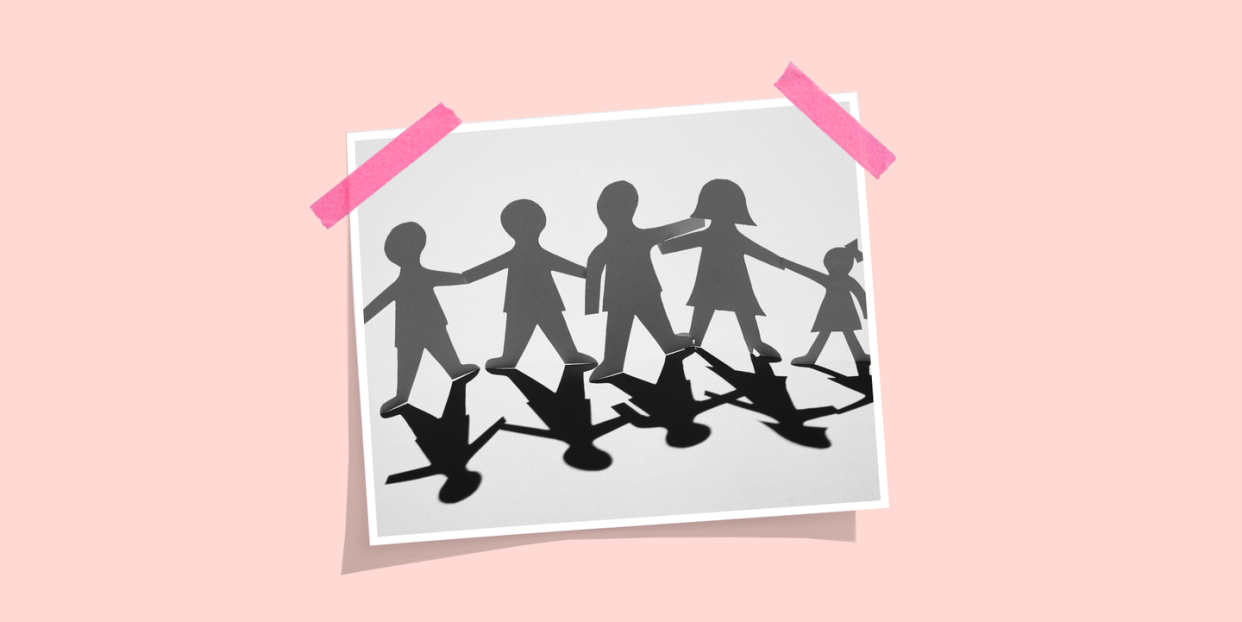Moms, It's Not Our Fault: There May Be More Going on Than Nature vs. Nurture

"Hearst Magazines and Yahoo may earn commission or revenue on some items through the links below."

When my four-year-old son, Clay, contracted a serious illness, I was certain it was my fault. Had I unwittingly done something terrible during pregnancy? Absorbed dangerous toxins from the milk I drank raw from the cows on the dairy farm where we lived when he was an infant? And what about the emotional distress I’d caused him by divorcing his father? No wonder my son wailed and clung to me like a barnacle when I dropped him off at day care. Clearly, I’d ruined his mental and physical health for life.
Mother-blaming has been going on ever since Eve gave birth to Cain and Abel. And though Freud reportedly said, “If it’s not one thing, it’s your mother,” no one is harder on mothers than mothers ourselves.
“There isn’t a mother I’ve worked with who hasn’t at some point expressed grief, sometimes agony, over the mistakes she believes she’s made in raising her children,” says Dr. Florence Falk, Ph.D., LCSW, a New York City psychotherapist who specializes in trauma, loss and life stage transition.
This sense of culpability may not be logical, but neither is love. Motherhood is a high-wire act, balancing fierce love with letting go, doing all we can to protect our kids, while recognizing that, in the end, we have no control over their fate.
Children can inherit trauma from prior generations
Of course, some mothers do cause irreparable harm to their children. But the average guilt-ridden, well-meaning mom is likely less to blame for what happens to her kids than she imagines. New research suggests that the formative influences on our offspring—influences that have nothing to do with how long we breastfed or whether we yelled—may extend beyond the old nature vs. nurture dichotomy. Of course, the DNA our children inherit from us determines key traits, but what about our daughter’s depression or our son’s fear of water? Nature? Nurture? Or something else entirely? The question has become more complex with advances in the field of epigenetics, the study of how environment can chemically modify how our DNA is expressed without actually changing our genetic code. Much of the research has focused on trauma, and whether epigenetic changes can be passed down from one generation to the next.
In January 2021, researchers at the University of Southern Florida studying the Tutsi people of Rwanda reported that the terror of genocide was associated with chemical modifications in the DNA of pregnant women and their children who had been exposed to the genocide, compared to pregnant Tutsi women and their children who weren’t. According to the study published in Epigenomics, “These findings suggest that, unlike gene mutations, these chemical ‘epigenetic’ modifications can have a rapid response to trauma across generations.”
Could this explain how my seemingly inborn anxiety might have been inherited from my maternal grandmother who, at age six, got stoned by the Cossacks in her Lithuanian village and remained terrified for the rest her life? Add to that all the other ancestors who had been persecuted—and my sense that I was wired for anxiety was probably sound. I wondered whether the blood disorder and extreme separation anxiety Clay experienced were in some way linked to family trauma.
It's possible, says therapist Mark Wolynn, author of It Didn’t Start With You: How Inherited Family Trauma Shapes Who We Are And How To End The Cycle. “Children express what’s unresolved between their parents, as well as what’s behind their parents. They can also mirror what their parents felt at their age but had long ago suppressed.”
When I think back to my own childhood, I recall how distressed I was at age four when it seemed as if my parents were on the verge of divorce. That’s the same age my son was when he began bruising easily, on the heels of my divorce from his father. Bruised spirit, bruised body? Which makes me question whether my feelings of terror at the prospect of my parents’ divorce, coupled with an excruciating divorce of my own, led to my son’s clinginess or sent his platelet count spiraling downward.
When I asked Wolynn if there could be a connection, he didn’t discount the possibility, but acknowledged it’s hard to know without further investigation. However, he did tell me the story of a 10-year-old boy he worked with who suddenly developed a rare neurological disorder that caused his skin to feel as if it were on fire. Doctors were unable to find a cause for the boy’s suffering, and his symptoms continued unabated until his father finally told him about his own unresolved grief. When he was 10—the same age his son's symptoms started —the father had been playing with matches in the family garage and ended up setting the house on fire. He escaped, but his brother died in the conflagration, and the boy’s father had never forgiven himself.
As Wolynn put it, “Because this trauma remained unhealed, the man’s son experienced burning sensations on his skin at the same age, only the family had never made the connection." But after the father told his son the truth and assured him that the story was his, the boy’s symptoms subsided. “I’ve seen these recurrences a lot,” Wolynn added. “Children often mimic what their parents, and sometimes their grandparents, felt but never expressed.”
Past lives may also affect young children, some researchers suggest
Epigenetics is only one possible explanation for a child’s physical or emotional difficulties that lets parents (especially self-blaming mothers) off the hook. While researching my novel, What Jonah Knew, which deals with memory and trauma, I stumbled upon the work of the late Dr. Ian Stevenson, a professor of psychiatry at the University of Virginia School of Medicine and founder of the Division of Perceptual Studies department there. Stevenson's decades-long research focused, in part, on young children with spontaneous recall of a previous life. Approximately 75 percent of the 2,600 documented cases Stevenson's team followed began giving detailed accounts, usually around age two or three, of other families and other homes where they’d lived "when they were big." As I read the case histories, it made sense to me that, if we accept the hypothesis that we live more than once, someone who experienced a sudden, brutal death would carry that residue in the form of traumatic memories into the next life.
While Stevenson passed away in 2007, the department he founded continues to apply scientific methodology to so-called paranormal phenomena including extrasensory perception (such as telepathy), apparitions and deathbed visions, after-death communications or ADCs, poltergeists, near-death experiences or NDEs, out-of-body experiences and children’s memories of previous lives.

Of course, there’s no way to conduct controlled clinical trials to prove we live successive lifetimes. But by verifying children’s statements to the degree possible, including having them identify photographs, objects, people and places from a previous life, the researchers have collected compelling evidence for reincarnation.
“We don’t know the mechanism by which the memories of a deceased person find their way into the mind of a child, just that there seems to be some continuity of consciousness,” explained child psychiatrist Dr. Jim Tucker, M.D., the late Dr. Stevenson’s successor at the University of Virginia. “Though kids may remember a previous life, it’s not as if Joe Blow comes back as John Doe. A child and the person he or she remembers are separate people, and usually children’s memories of the previous life fade by the time they’re six or seven.”
When I asked him how the parents of kids he’s studied usually react to these revelations, Dr. Tucker said, “Many are relieved that we take their child’s experience seriously. Whether we’re able to verify their memories or not, that alone can help lessen the parents’ feelings of guilt.”
As I continued to wrestle with my own nagging guilt over my son’s childhood blood disorder and separation anxiety, I couldn’t help wondering if they could have had their roots in another lifetime. Carol Bowman, M.S., a therapist and author of Children’s Past Lives has been counseling families with children who speak spontaneously of a past life ever since her now-grown son, Chase, began talking at age two about being killed during the Civil War. Bowman told me that physical symptoms are often inextricably linked to strong emotions when a child recalls a previous lifetime. And as in cases of inherited trauma, “If the child is encouraged to express his or her emotions, usually both the difficult feelings and physical symptoms disappear.”
Knowing my son’s illness wasn't my fault put my mind at ease
My son never claimed to remember having lived before—and it never occurred to me to explore the possibility with him. In any case, now we'll never know. According to Bowman, “Unless a child spontaneously starts speaking about a previous life, I don’t suggest to parents that they bring it up. That would only create confusion.”
Even though I may never know for sure whether it was something I did or forces beyond my control that caused Clay to fall ill or be anxious during his childhood, I’m happy to report that he’s alive and well, with two children of his own. And though there are still times when I wish I could have a do-over of some of the mindless blunders I made while raising him, I’m more forgiving of my younger, guilt-ridden self than I used to be, in part because I’m able to view his story—and mine—through a wider lens.
Barbara Graham's new book, What Jonah Knew, is now available from your favorite bookseller. This essay is part of a series highlighting the Good Housekeeping Book Club — you can join the conversation and check out more of our favorite book recommendations.
You Might Also Like